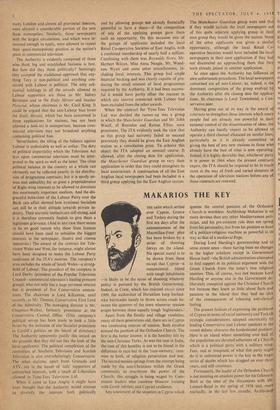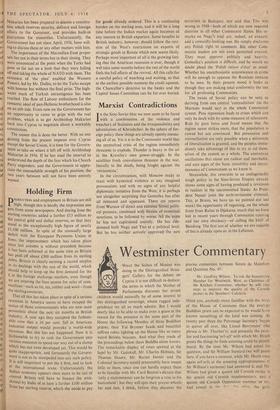MAKARIOS THE KEY
THE calm which settled over Cyprus, Greece and Turkey during the first ten days after the announcement of the Macmillan-Foot plan has been broken by a series of shooting forays on the island. No special moral is to be drawn from these except that Cyprus—a mountainous island with tough inhabitants —is likely to be the scene of shooting whatever policy is pursued by the British Government. Indeed, in Crete, which has enjoyed enosis since 1909, the authorities of Heraklion keep barbed- wire barricades handy to throw across roads be- tween the quarters of the town whenever tension erupts between those equally tough 'highlanders.'
Apart from the family and village vendettas, many of them generations old, there are in Cyprus two continuing sources of tension. Both revolve around the position of the Orthodox Church. The first is the better known; it is the hostility felt by the non-Christian Turks. As was the case in India, the root of this hostility is not to be found in the difference in race but in the 'race-memory,' com- mon to both, of religious persecution and war. The second tension springs from the attempt being made by the non-Christians within the Greek community to overthrow the power of the Church; this struggle is. being waged by Com- munist leaders who combine Moscow training with Greek subtlety and Cypriot resilience.
Any assessment of the situation in Cyprus which ignores the central position of the Orthodox Church is worthless. Archbishop Makarios is no more devious than any other Mediterranean poli- tician, and his pre-eminent role does not spring from his personality, but from his position as head of a politico-religious machine as powerful in its way as that of a mediteval Pope.
During Lord Harding's governorship and to some extent since—there having been no changes in the higher echelons except in Government House itself—the British administration attempted to find support in its political argument with the Greek Church from the latter's two religious enemies. This, of course, was not because Lord Harding or anyone else in the Government de- liberately conspired against the Christian Church but because they knew so little about facts and passions in the island that they had no idea of the consequences of releasing anti-clerical feeling.
The present fashion of expressing the problems of Cyprus in terms of racial animosity and Turkish strategic considerations, adopted uncritically by Leading Conservative and Labour speakers in the recent debate, obscures the fundamental problem. Here is on island where something over half of the population are devoted adherents of a Church which is a political party with a military wing. Fear, real or imagined, of what this party might do if in unfettered power is the key to the tragic series of deaths which has dragged on over three years, and still continues. Fortunately, the leader of the Orthodox Church is not insisting on absolute power for his followers. Both at the time of the discussions with Mr- Lennox-Boyd in the spring of 1956 and, more markedly, in the last few months, ArchbishoP Makarios has been prepared to discuss a constitu- tion which reserves security, defence and foreign affairs to the Governor, and provides built-in guarantees for minorities. Unfortunately, the Government has not since April, 1956, been will- ing to discuss these or any other matters with him. The importance of the Macmillan-Foot propo- sals lies not in their terms but in their timing. They were announced at the point when the Turks had gone so far out on a limb that they were falling off and taking the whole of NATO with them. The existence of 'the plan' enabled the Western Powers, led by Mr. Dulles, to let the Turks escape With honour but without the final prize. The high- water mark of Turkish intransigence has been reached. The flow of Labour enthusiasm for the romantic ideal of pan-Hellenic brotherhood is also on an ebb tide. From now on the Government has an opportunity to come to grips with the real problem, which is to get Archbishop Makarios back into Cyprus to negotiate about a workable constitution. The sooner this is done the better. With no one gaining from the present impasse over Cyprus except the Soviet Union, it is time for the Govern- ment to take on where it left off with Archbishop Makarios in 1956. If he has used the interval to understand the depth of the fear which his Church Party engenders, and the Government to appre- ciate the unassailable strength of his position, the two years between will not have been entirely wasted.























































 Previous page
Previous page